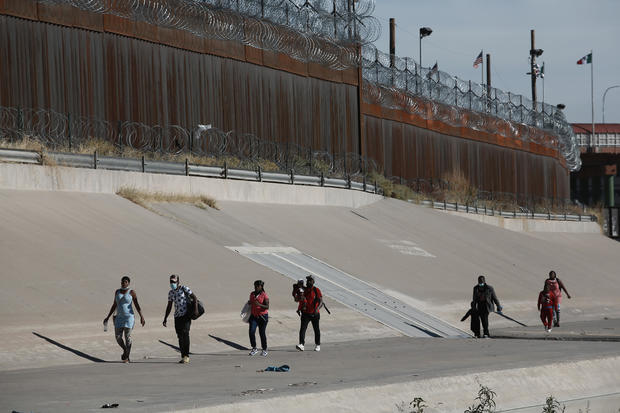The number of unauthorized migrants who entered U.S. custody along the border with Mexico decreased by 14% in January from the previous month, reaching the lowest level since February 2021, which marked the start of an unprecedented spike in migrant arrivals, government figures disclosed Wednesday show.
U.S. border officials processed migrants 153,941 times last month, according to Customs and Border Protection (CBP) data provided to a federal court in Texas. While the number represents the second-highest month-to-month drop in migrant apprehensions during the Biden administration, it is the highest tally for January since fiscal year 2000, according to historical Border Patrol data.
More than half of those taken into U.S. border custody in January were swiftly expelled to Mexico or their home countries under the Trump-era Title 42 emergency order, which the government has said remains necessary to curb the transmission of COVID-19 inside migrant detention facilities.
Another 75,455 migrants were processed under regular immigration procedures, which means they are either placed in expedited deportation proceedings, taken to long-term detention centers or released to continue their civil immigration court cases in U.S. communities, the statistics show.
In January, CBP officials released 46,186 migrants and deported or returned 6,775 migrants under U.S. immigration law. Unlike those subjected to the Title 42 policy, migrants processed under immigration law are allowed to request asylum as a way to prevent their deportation.
The Biden administration has been under intensifying pressure from Democratic lawmakers to halt the Title 42 expulsions, which were first authorized by the Centers for Disease Control and Prevention in March 2020 over the objections of public health experts at the agency.
But the Biden administration said earlier this month that the expulsions would remain in place for the time being given the spread of the Omicron variant, which emerged in the U.S. late last year.
In a letter to Mr. Biden on Wednesday, more than 100 congressional Democrats, including Senate Majority Leader Chuck Schumer, condemned Title 42, highlighting the policy’s impact on Black migrants, including the thousands of Haitians who have been expelled to crisis-stricken Haiti in recent months.
“It is time to undo the United States’ draconian immigration policies, particularly policies introduced under the Trump Administration, such as the use of Title 42, that circumvent our humanitarian obligations,” the lawmakers wrote.
Christian Torres/Anadolu Agency via Getty Images
Meanwhile, Republican lawmakers, who blamed the record number of migrant arrests last year on Mr. Biden’s reversal of certain Trump-era restrictions, have urged the administration to continue the expulsions, saying migrant arrivals will increase even more if Title 42 is revoked.
Soon after Mr. Biden took office, his administration exempted unaccompanied children from Title 42. Since then, the policy has been mostly used on Mexican and Central American single adults and some families with children, though Mexican officials have placed limits on the number of families who can be turned back.
The Biden administration has also struggled to apply the expulsion policy to migrants from Venezuela, Cuba, Nicaragua and other countries given Mexico’s decision to generally only accept the return of its citizens and migrants from Guatemala, Honduras and El Salvador under Title 42.
Last month, the Mexican government, at the request of the U.S., imposed visa requirements on Venezuelans, many of whom were traveling by air to Mexico City before reaching the U.S. border by land.
As part of other efforts to reduce the flow of migrants traveling to the U.S., Mexico ended visa-free travel for citizens of Brazil and Ecuador, who trekked to the southern border in record numbers during Mr. Biden’s first year in office. The number of migrants from those countries caught at the U.S. border subsequently plummeted.
The Biden administration has also been enrolling Nicaraguans, Venezuelans and Cubans in a Trump-era program that requires them to await their U.S. asylum hearings in Mexico. About 92% of 673 migrants subjected to the policy’s court-ordered revival have hailed from those three countries, a government report shows.
While it has not indicated when Title 42 will be lifted, the Biden administration is preparing to expand efforts to track migrants released from border custody through alternative to detention programs, including a home arrest pilot, according to an internal Immigration and Customs Enforcement (ICE) memo obtained by CBS News.
The home curfew program, which will be piloted in Houston and Baltimore, could be scaled up to accommodate up to 150,000 migrants, according to the ICE memo. The pilot was first reported by Axios.
“I think they are pivoting gradually to life after Title 42. You’re seeing elements of what could be a future strategy for managing the border that’s different from what we’ve seen during the past year, but I don’t think we know what it is yet,” said Andrew Selee, president of the non-partisan Migration Policy Institute.
The Biden administration is also finalizing a rule that would attempt to speed up the asylum process by allowing asylum officers to fully review migrants’ claims, instead of sending them to the immigration courts, which have a backlog of nearly 1.6 million unresolved cases.
In an interview with CBS News last month, Homeland Security Secretary Alejandro Mayorkas said the asylum rule would be a key component of the Biden administration’s border policy post-Title 42.
“We view that as a really strong improvement to a broken system,” Mayorkas said.
Editor’s Note: This story previously stated that migrant apprehensions last month represented an all-time high for January. It has been updated to reflect that they represented the highest tally since January 2000, or the second-highest total for that month.

